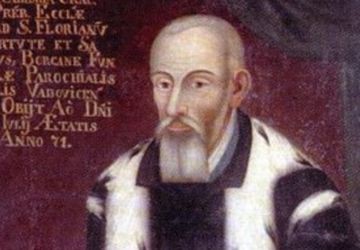Polish priest, theologian, professor, and the Deputy Chancellor of Jagiellonian University in Kraków and benefactor.
Marcin Wadowita (Martius Campius Vadovius), also known as Marcin Kępka, was born around 1567 in Wadowice. His father was a town councillor, and other relatives were among the elite of Wadowice. The legendary fate of the young Wadowice resident is recounted by Andrzej Komoniecki in his work 'Chronografia albo Dziejopis Żywiecki' (Chronography or History of Żywiec), which was written at the turn of the 17th and 18th centuries. One day Marcin was sent to herd pigs. Unfortunately, he did not notice how a wolf snatched one of the pigs from him. Apparently terrified, Wadowita, fearing his father's wrath, decided to run away from the family home and went to Kraków, where he received his education. As a scholar he is supposed to have said: "If it were not for that pig, Wadowita would not be a scholar".
According to historical research, Marcin Wadowita was supported by his family and local authorities from the beginning of his career. In 1583, he enrolled at the University of Kraków. During the first years of his studies he was described as a secular cleric. It is not known what Marcin's living conditions were like in Kraków, perhaps like many students he begged for handouts and food. Thanks to the lessons he took at the Wadowice parish school, especially his Latin lessons, Wadowita was prepared for his studies in Kraków. He was able to achieve further degrees fairly quickly. In 1588 he became a bachelor of liberal arts, and in 1590 he received a master's degree. He then served as senior of the schools first at St Nicholas' Church and then at St Stephen's. He taught at the Major and Minor College. From 1600, he held the office of Dean of the Faculty of Philosophy at the Kraków Academy, and three years later he became a Bachelor of Theology. Before he received his doctorate, he was counted among the professors of the Faculty of Theology at the Kraków Academy. He spent the years 1605-1606 on further studies in Italy, where he was educated at the Jesuit Collegium Romanum in Rome and in Padua. Influenced by the sermons preached in Italy by Marcin Wadowita, Pope Clement VIII is said to have said that 'With Wadowita, knowledge is angelic, voice is devilish, and habits are peasant'.
Marcin Wadowita was a leader of academic disputes. He commented in his lectures in 1591 on the works of the Transylvanian reformer Jan Honter. In 1608, King Władysław Vasa was said to have listened in person to a dispute with the participation of Marcin Wadowita.
He was dean of the Faculty of Theology on a number of occasions between 1618 and 1636, and in 1636 became vice-chancellor of the Kraków Academy and chancellor of the bishop's curia.
He is credited with the authorship of 10 printed works, although in fact he authored four theological treatises: 'On the Incarnation', 'On the Merit of Christ', 'On the Will of God and the Basis of Restraint', 'On the Foundation of Eternal Happiness' and the 'First Means of Salvation which is the Inner Act of Faith'.
For a long time he could not decide whether he wanted to become a priest. He did not become one until 1602 and served as a priest for the next 30 years. Despite holding a doctorate in theology from the Jesuit university in Rome, Wadowita actively sided with the university against the Jesuits in a dispute over education.
In 1598, he saved from oppression the Arian theologian Faust Socyn, who would have suffered death at the hands of enraged Kraków students. He delivered him from the hands of his would-be tormentors and gave him shelter in his own room at the Collegium Maius. Although he argued with Socyn about the validity of his heretical views, he did not believe that violence was the solution to the religious problems facing the age. A grateful Socyn later wrote a letter thanking him for saving his life. Martin Kepka also interceded for other Protestants, such as the Calvinist goldsmiths.
His hometown was proud of his successes, as the town councillors made an entry in the town book regarding the doctorate received by Wadowita. The poet of the time, Wojciech Samborski, in a poem of 1640, presented Wadowita as one of the greatest scholars of the Kraków Academy. The piece was publicly delivered by the author during a ceremony in the Aula of the Collegium Maius.
Marcin Kępka, known as Wadowita, died on 27 or 28 January 1641. In his will, in addition to donations for pious causes and funeral expenses, he allocated part of the funds to a scholarship fund for the youth of Wadowice. He also made endowments to the Wadowice school and hospital. According to tradition, the universally loved professor was farewelled in crowds by the people of Kraków. He was buried in the Church of St Florian in Kraków. Unfortunately, the epitaph in the church was completely destroyed during the Swedish Deluge. Its contents are known from the work of Szymon Starowolski - Monumenta Sarmatorum.

